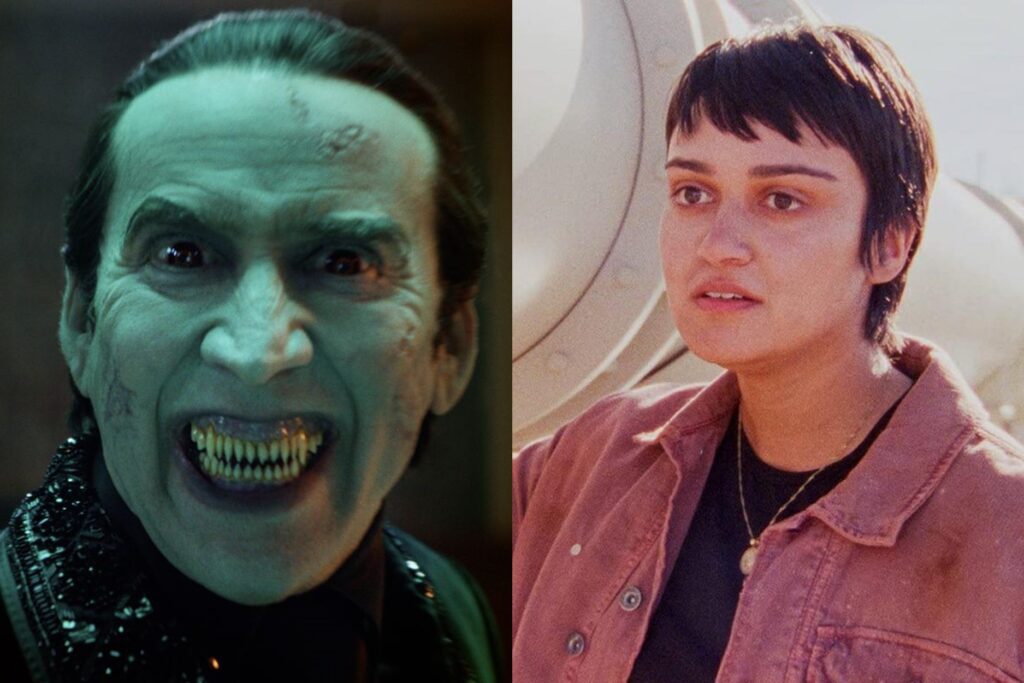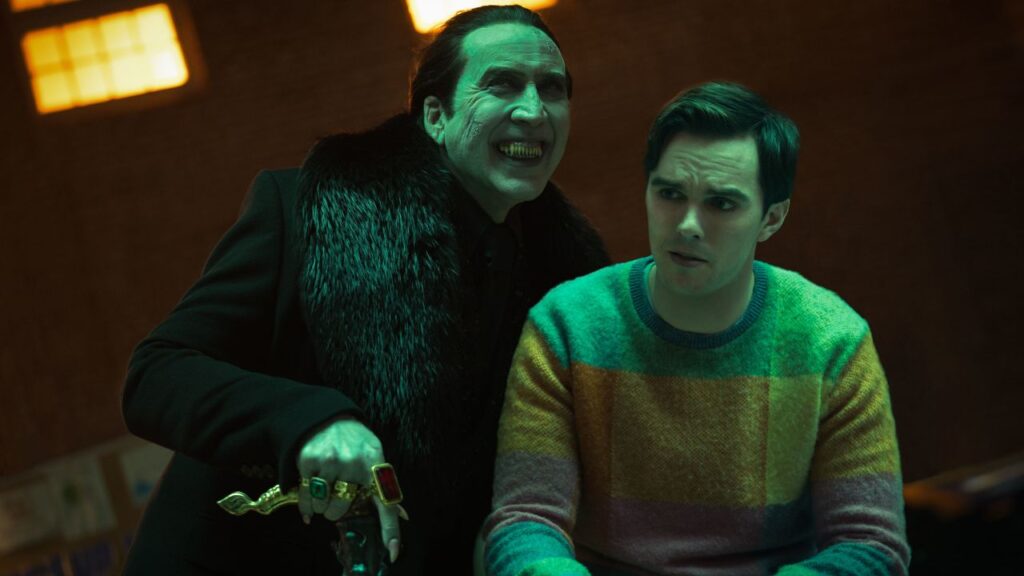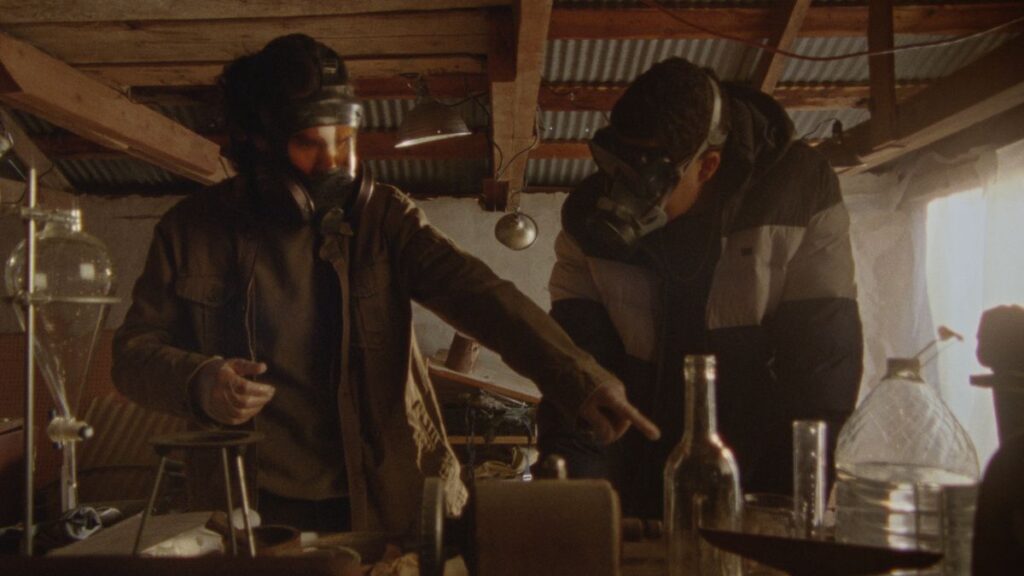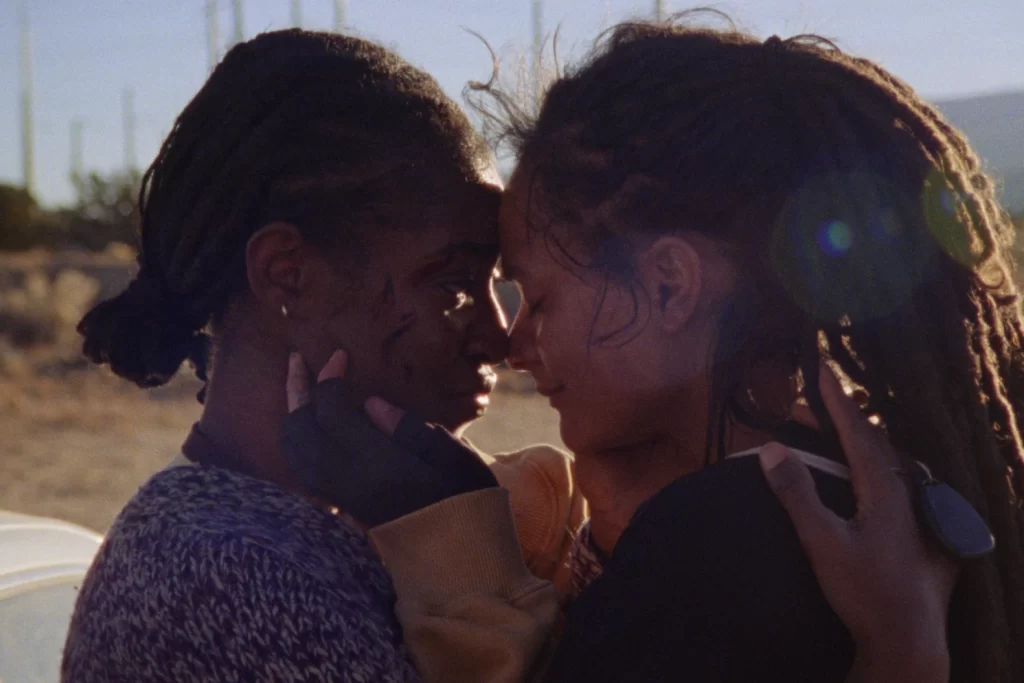
As premises go, “Nicolas Cage plays a campy Count Dracula” is a pretty good one. And Renfield, Chris McKay’s new horror-comedy, eagerly exploits the goofy appeal of its conceit; it slathers one of American cinema’s most (in)famous overactors in revolting makeup, dresses him in baroque wardrobe, and affords him ample opportunity to howl, snarl, and preen. Still, as Cage vehicles go, it’s less unhinged than some of his more maniacal late-period work, and in fact his performance works best when he pretends to modulate his hammy instincts with faux politesse, like a dormant volcano teasing you with the prospect of imminent eruption. When an associate informs Dracula that he was just on his way to see him, the vampire’s smiling response—“Oh, you were on your way”—drips with such performative understanding, you wonder if he feeds on anxiety rather than blood.
That associate, of course, is Robert Montague Renfield (Nicholas Hoult), and the problem with Renfield is that it’s mostly about Renfield. This isn’t the fault of Hoult, a fine actor and capable showboat in his own right. (If you haven’t seen him on Hulu’s The Great, you’re missing one of the small screen’s most marvelous imbeciles.) And it makes strategic sense to keep Cage’s wildness in reserve so that he doesn’t drain the film of its oxygen. But the product that McKay and his screenwriter, Ryan Ridley (fleshing out a Robert Kirkman pitch), have constructed around their stars is too flimsy to support the weight of their talent. It’s an idea in search of a movie.

Not that Renfield lacks for incident. Despite running only 93 minutes, its plot—a stupefying stew involving a New Orleans crime family, a support group for codependents, and a corrupt police department (note the station-house banner, “Don’t solve the crime till overtime”)—is crammed with quirky arcs and random figures. (Poor Shohreh Aghdashloo is cast as an evil matriarch who isn’t afforded the same strutting freedom as the boys.) The story’s stupidity is immaterial, because Renfield understandably doesn’t care about narrative logic. (The script is gratifyingly sparse when it comes to vampiric lore, and the bits of fantasy detail it does supply are generally amusing, most notably the unintended consequences of a welcome mat.) It’s more invested in functioning as a dialogue comedy and an exercise in cartoonish violence.
It fails on both counts. I won’t pretend that I never laughed during Renfield (mostly when Cage is on screen), but for the most part, its putative jokes are obvious and awkward. McKay, whose prior feature was the glum sci-fi adventure The Tomorrow War, has assembled agile comic performers like Awkwafina and Ben Schwartz, but he exhibits little idea of how to use them; the former is saddled with playing the straight woman, while the latter mistakes erraticism for humor. Even the 12-step scenes, which should make an easy meal of Renfield’s supernatural predicament, tend to wander in want of punch lines.

Taste in comedy is subjective (as is taste in all things), but Renfield’s shortcomings as a gore-fest are more glaring. Perhaps patterning the film after exaggerated hits like Kingsman and Deadpool, McKay seems to have convinced himself that a movie’s caliber is directly proportional to its amount of exposed viscera. I have no quarrel with extreme violence on screen—I enjoy the works of Quentin Tarantino, David Fincher, and Nicolas Winding Refn (well, once)—but the carnage here is witless and self-satisfied; when Renfield, who draws his power from munching on bugs (the dilation of his pupils recalls Requiem for a Dream), thrusts an adversary’s severed arms into another foe’s stomach, you can practically hear McKay chortling to himself. There are lots of bloody stumps and squashed heads and spurting orifices, and it’s all choreographed without any regard for visual style or spatial coherence.
I suggested earlier that Renfield is stupid, but it at least manages to be stupid in a semi-smart way. Initially conceived to be part of Universal’s now-defunct “Dark Universe,” it instead attempts to correct for the relentless sobriety of the modern fantasy genre, treating the prince of darkness with a healthy measure of irony and skepticism. That’s a decent concept, but the execution is lacking. At one point, Renfield compares himself to an empty husk, and the metaphor proves all too fitting. The movie that bears his name has been exsanguinated—drained of all life. Grade: C

Even before its Neon studio logo appears on screen, How to Blow Up a Pipeline announces itself as a piece of filmmaking advocacy, with title cards encouraging viewers to seek out information on America’s indigenous population. It’s a well-intentioned gesture that also operates as something of a warning sign; works of agitprop often focus so squarely on communicating their message, they tend to forget to behave as creatures of cinema.
So I’m happy to report that How to Blow Up a Pipeline is first and foremost a movie—and a pretty good one, too. Sure, it has plenty to say: about the march of colonial imperialism, about the callousness of corporate greed, about the ravages of climate change. But it packages its ideas inside a taut and spiky thriller, one that accumulates considerable tension and momentum. It may aim to stimulate your conscience, but it’s just as likely to attack your nerve centers.

Directed by Daniel Goldhaber from a script he wrote with Ariela Barer and Jordan Sjol (adapting Andreas Malm’s book), How to Blow Up a Pipeline maximizes its slender budget with scrappy flair. As its title suggests, it is primarily instructional, chronicling the efforts of a group of activists (one might say ecoterrorists) to sabotage two pieces of oil infrastructure in West Texas. On the whole, the film is less polemical than procedural, examining the perilous-yet-grubby toil—assembling blasting caps, wiring detonators, mixing chemicals in giant barrels—inherent in the cadre’s mission.
The movie’s opening scenes—which unfold with minimal dialogue as eight characters arrive from various points of origin at a dusty southern bungalow—are so absorbing, it’s initially deflating when Goldhaber suddenly pulls us backward in time, with another title card (supplying two names) implying that we’re gradually going to learn how this gritty crew came together. But fears that How to Blow Up a Pipeline will proceed as one of those contrived “everything is connected” mosaics prove unfounded. Instead, the flashbacks help round out the story without sapping its energy; to the contrary, the film is edited in such a way—often via shocking cuts to black smack in the midst of hectic present-day happenings—as to amplify the simmering suspense.

A few of the participants in this scheme (crime?) occasionally verge on archetypal; the size of the principal octet, combined with the lean pacing, prevent Goldhaber from fully developing all of his characters. (Those who do make an impression include a terminally ill young woman (American Honey’s Sasha Lane) who insists she has nothing to lose, a smiling reveler (Sharp Stick’s Kristine Froseth) who may be pursuing her own agenda, and the sick woman’s girlfriend—a bereaved college dropout played by Barer.) And the action fan in me craved a bit more excitement and logistical rigor; a late sequence involving a crucial valve and a few clueless cops (much like Renfield, the film takes a notably jaundiced view of law enforcement) doesn’t pop with the necessary vigor.
At the same time, the minimalist quality of the set pieces—one riveting scene entails the troop simply trying to hoist a barrel—is in keeping with the movie’s ground-level intensity. How to Blow Up a Pipeline is a political picture in multiple ways; not only does it advance a philosophical argument, but it also considers how various constituencies band together to achieve a desired result. Each of its characters has their own reason for resorting to extralegal behavior, but they’re united by a shared sense of grievance, along with a collective intent to challenge the status quo. By concentrating on the mechanics of their anger rather than its source, the movie becomes urgent and provocative, if not quite explosive. Grade: B
Jeremy Beck is the editor-in-chief of MovieManifesto. He watches more movies and television than he probably should.
